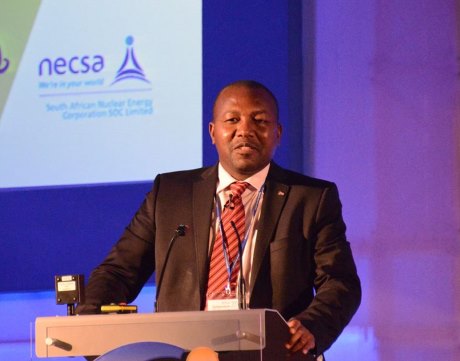South Africa plans for sustainability
12 September 2014
Plans for nuclear power figure heavily in South African energy policy - and the country aims to ensure long-term security of supply by developing its own fuel cycle capabilities.
 |
Necsa CEO Phunzile Tshelane addresses the WNA Symposium (Image: WNA) |
Speaking at the World Nuclear Association's 2014 Annual Symposium on 11 September, Phumzile Tshelane, CEO of the Nuclear Energy Corporation of South Africa (NECSA), outlined the country's nuclear economy and the nuclear policies supporting it.
South Africa has a long and proud nuclear energy history, with two operating units at Koeberg not to mention involvement in nuclear research activities dating back to the 1940s, and nearly 50 years' experience of operating research reactors. Today the country is faced with a need to broaden its energy mix both to meet its electricity needs as it strives for economic growth, and to enable it to reduce carbon dioxide emissions.
The country's 2010 Integrated Resource Plan, which received governmental approval in early 2011, sets out a blueprint for a sustainable energy mix including a potential 10 GWe of nuclear capacity as well a procurement process for renewable energy. South Africa, Tshelane explained, sees renewables and nuclear working alongside each other, but nuclear is of particular importance - a fact recognised earlier this year in statements by both South African president Jacob Zuma and energy minister Tina Joematt-Patterson, who has described the nuclear option as a "certainty" as a means to alleviate energy shortages in a country that has abundant coal but no indigenous natural gas. "We don't have much of a choice," Tshelane said. "We have coal - or nuclear."
South African cost calculations for nuclear power are based on the full nuclear fuel cycle from cradle to grave. The country is already a uranium producer and exporter, with output of 540 tU in 2014 – more than enough to meet its own needs. Speaking to World Nuclear News, Tshelane described Necsa's role in moving towards a domestic nuclear fuel cycle under South Africa's 2008 policy more fully. While that policy ultimately envisages conversion, enrichment and fabrication facilities as well as reprocessing of used fuel, the company is already "seriously looking" at establishing its own fuel fabrication capability - initially using feed materials processed in conversion and enrichment plants overseas.
Although South Africa might pursue interests in conversion and enrichment capacity through partnerships with other fuel cycle companies, Tshelane expressed some interest in the possibility of a domestic uranium conversion plant as another relatively near-term development.
At the other end of the fuel cycle, South African policy does not preclude reprocessing of used nuclear fuel. "Reprocessing is simply a way of utilising more of the 'good stuff'", Tshelane explained, while acknowledging that this would be a development for the future rather than the nearer term.
South Africa's economy already benefits from numerous non-energy nuclear applications - it is already a major supplier of radioisotopes on a global scale through Necsa's NTP Radioisotopes arm - and with a mature set of nuclear and energy policies, laws and regulatory regimes, the country is poised for new build.
Researched and written
by World Nuclear News